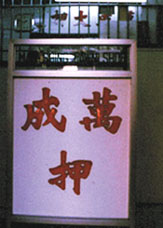 |
 |
 |
Old institution still
alive in Hong Kong
By Ellen Chan
A small entrance leads one into a shop that is rather dark. Immediately, a great wooden gate blocks his way. Pushing it, the customer encounters a tall reception counter. And above this tall counter is the stern head of a salesman looking down at him like a judge.
These are not modern retail shops where salespersons have to offer many services to attract customers. Instead, clients go into these shops for other kinds of transactions.
These are Hong Kong's pawn shops. They give customers money in return for their own belongings.
However, the customers can redeem their goods within a certain period of time — at a slightly higher price.
Pawnbroking was among the earliest businesses in Hong Kong. It emerged when the Territory was still ruled by China.
In the 1950s, many refugees came to Hong Kong after the Communists took over China. Some of them worked in new factories, but more were unemployed. At that time, visiting pawnbrokers seemed to be a daily routine.
"The living standard then was very low. The only resort for poor people to get money instantly was pawnbrokers," explained Mr. Yau Kin, who has been working at a pawnshop in Causeway Bay for more than 40 years.
Clothing, quilts, watches and valuables were the most common goods people pawned.
"In order to redeem the goods, customers had to pay interest within four months. Once the contract expired, we would resell the things to second-hand and jewellery shops," said Mr. Yau.
The interest rate today is 3.5 percent a month.
Said Mr. Yau: "Customers can now only deposit gold watches, jewellery and valuables. As for clothing, we just accept mink coats."
Although fewer people go to the shop, Mr. Yau thinks that "his business has no problem".
The pawnshop Mr. Yau works in is owned by a loan company which has a chain of pawnshops. This collective ownership helps the pawnshop survive.
"Those who have minor financial problems can get money here immediately," said Mr. Yau.
Mr. Cheung Chuen, 66, a frequent visitor of pawnshops, pointed out one advantage over bank loans.
"Old people like me need only a few hundred dollars for emergencies. But banks would not offer any help to us," said Mr. Cheung.
Said he: "If I borrow money from my friends and relatives, our relationships might be ruined due to financial conflicts. I would rather pay some interest than risking our relationships."
Mr. Y. C. Fung, 33, visited a pawnshop 10 years ago. He said it was "absolutely not embarrassing" for him.
"It was especially convenient as I could not borrow money from other sources. I just had to pay interest. It served me like a bank," said he.
Mr. Chan Yiu-tin has gone to pawnshops for 30 years.
"My salary was low when I was young. I pawned my watch or fountain pen for some money at the end of each month," Mr. Chan said.
When his salary was paid, Mr. Chan would redeem his belongings.
"I deposited things in pawnshops I did not want when living was no longer a problem," said Mr. Chan.
Mr. Yau said they pay their customers according to an object's resale price. And the price is easy to find out. But he declined to explain this in detail.
Pawnbrokers have a Chinese nickname, lui kwang kung, meaning men struck by lightning. It is a curse on them because they are often criticized as arrogant, cruel, cunning and profit-oriented.
However, Mr. Yau thinks that pawnshops do play an important role in maintaining society's prosperity.

January 1997
Return to contents
